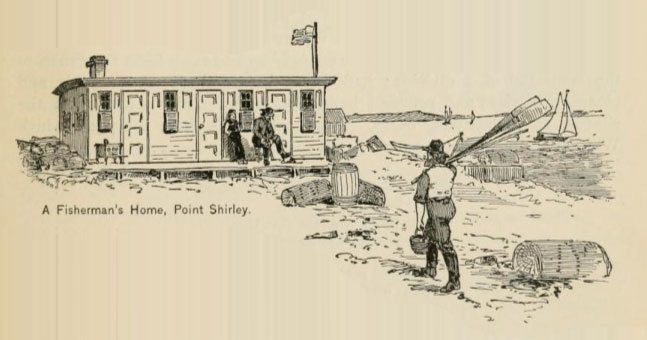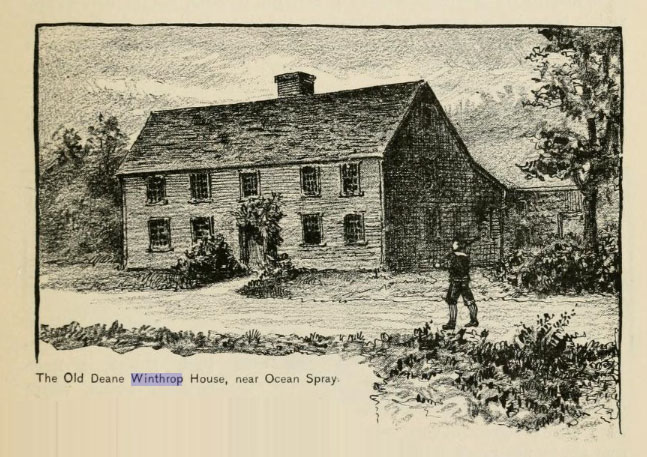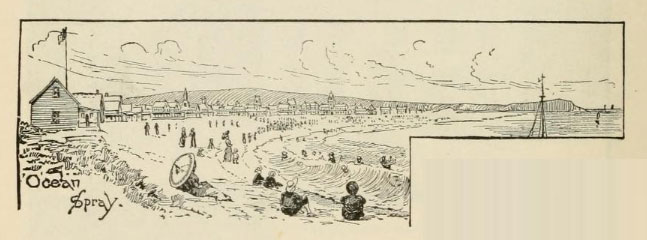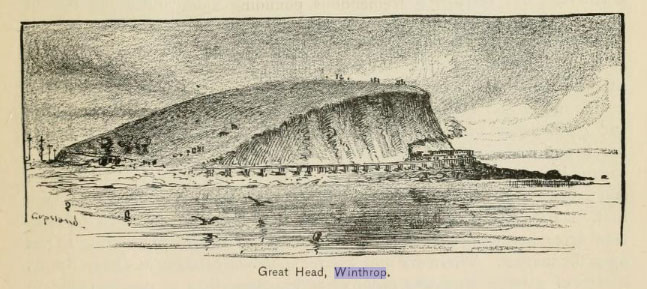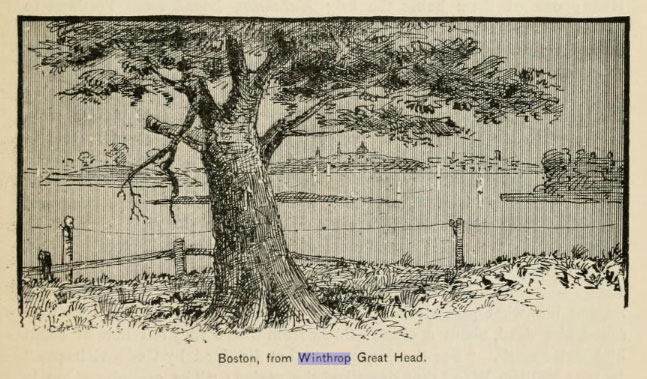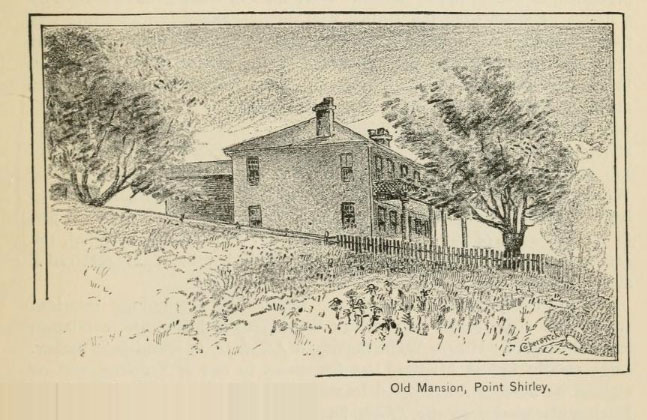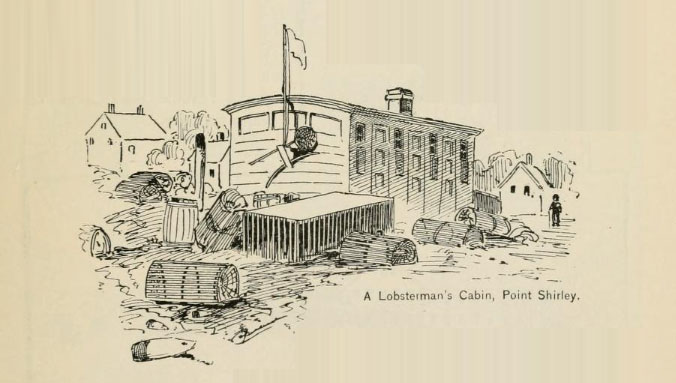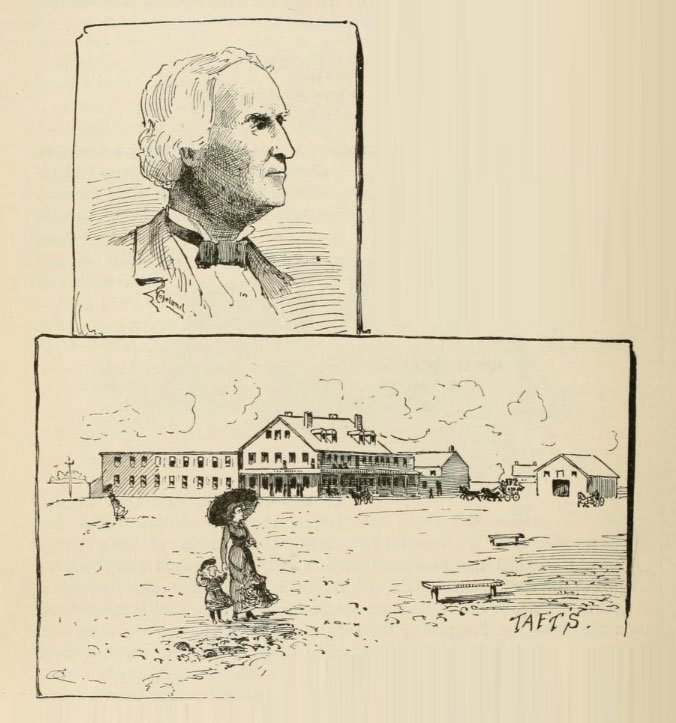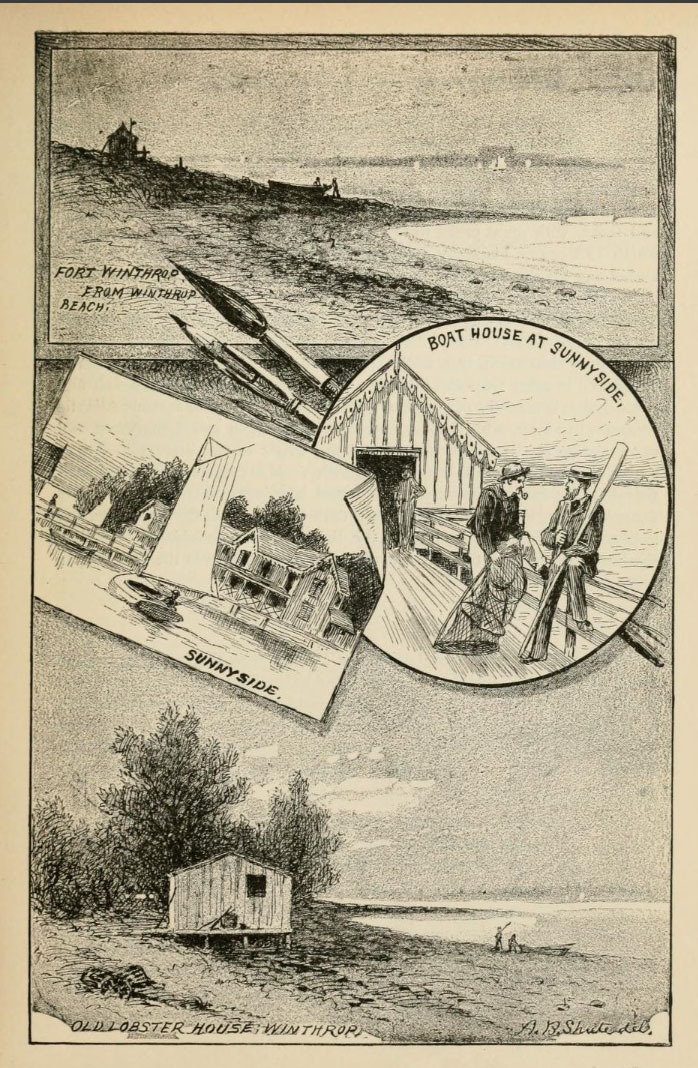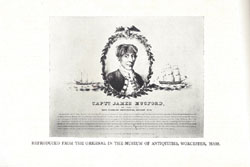(Illusration) 130 channel of commerce and its procession of ships, remains a village in which Judd's Margaret might find herself at home. The ghost of Gov. Winthrop, flying from Irish-Italian-Portuguese Boston, may rest here, on his son's summer farm, and say, "What! and grown so little in a quarter of a millennium! " It is still remarkably free from the foreign element, and consequently enjoys almost a complete immunity from pauperism and crime. Liquor is legally banished from its borders, a fact to which the delightful peacefulness and decorum of the beach villages may be attributed. Bibulous roisterers find a woefully dry country south-east of Revere Beach, and make no second visits there. "Mourn, Essex, on thy sea-blown shore, " As Galahad pure, as Merlin sage. After the death of the gallant young general, the Bayard of the army, the estate passed into other hands. Farther toward the city, on a picturesque point projecting into the harbor, stands the fine old mansion occupied for so many years by the eminent educator, George B. Emerson, and often 131 visited by Agassiz and other scholars. The trees which shade the avenues and grounds were planted by his own hand, and greatly beautify the place.
(illustration) lived hereabouts for forty years. He was the founder of the town of Groton, which he named for the home of his family in England. A little way beyond this ancient house, and over Ocean Spray, is the noble headland of Grover's Cliff, whose 180 acres of rolling pasture-land were for many years owned by the corporation of Boston. In 1867 the city council ordered the construction of a new and magnificent hospital for the insane, on this estate; but the mayor vetoed it, being opposed to such a large outlay of money, and also objecting to the establishment of a public institution on an exposed headland. The subsequent erection of the State Asylum at Danvers rendered it unnecessary; and the land staid in possession of the city until 1883, when it was sold at auction. It is now known as Winthrop Highlands, and has two summer-hotels, the Argyle and Aloha, and many cottages and villas. A noble seashore drive runs from Beachmont across the Highlands to Point Shirley. 132 Spray and Point Shirley are the chief ones, but Crystal Bay and Sunny Side and Harbor Avenue each has its advocates and habit-ices. Sunny Side is a little group of summer cottages, with boat-house, wharf, and still-water beach, fronting southward on the harbor, near Snake Island and its wide entourage of flats. This colony of sequestered houses is usually occupied of late years by the Vokes family, so famous in the annals of British and American comedy.
(illustration) "Like eye of God aglare These pretty pleasure-houses are but the formal successors of the summer wigwams of the red men who were once lords of the soil, stalwart hunters and fishers, and gallant archers. The Indians who dwelt on this side of the harbor were of the Pawtucket tribe, whose domains reached as far as Concord and Portsmouth. The head of the clan at Chelsea (Winnisimmet) was Sagamore John, who died in 1633, with many of his people. The Winthrop peninsula, surrounded with fishing-grounds, appears to have been a favorite resort of the red men; and many remains of their wigwam villages have been found upon it. One of the first edicts published by the 133 Puritans at Boston established a game-preserve here, saying: "That noe pson w’soeuer shall shoote att fowle vpon Pullen Poynte or Noddles Island, but the sd places shalbe reserved for John Perkins to take fowle wth netts." In 1635 the peninsula became a common, for pasturage; and Boston caused a house and cattle-yard to be built at the Point. The territory appears to have been occupied subsequently by farms, owned by non-resident proprietors, who kept here servants and tenants. In the summer they sometimes came down from Boston, to enjoy the sea-air, and relief from the turmoil of the town, which then had four or five thousand inhabitants. Deane Winthrop had an estate of 120 acres at Pulling Point, and here "he was wont to set up a bush when he saw a ship coming in." Capt. Gibbons also had a place nearby; and once (in 1643) his wife and family, on their way down from Boston to the Point, were terribly frightened on meeting La Tour's French ship. Slavery flourished here in those ancient times; and
(illustration) the negro burying-ground in the north part of the town had many quaint monuments. Connected with the Bill mansion, on Lincoln Street (now over two centuries old), were several sable slaves; and their bills of sale are still preserved. There is a legend that one of these negroes buried his acquisitions, -- a tea-kettle overflowing with silver coin, — and died without revealing its whereabouts. This is the Captain Kidd's treasure of Winthrop, and has stimulated no end of delving on its pleasant headlands. 134 and return, up the blue floor of waves, leading some other thousand-ton beauty, the Empress of the Seas perchance, or the Saucy Sally of Kennebunk, or La Reina Margherita of Genoa. Meanwhile Winthrop placidly observes the scene, the fair wall-flower of the harbor. 135 Nat. C. Goodwin, and other stage celebrities, are often rehearsed among these beauties of nature. At the north end of the beach is The Shirley, a comfortable summer-hotel of modern construction and accommodations, and very close to the edge of the surf. Near the Shirley is the pretty little building of the Casino, adapted and used for dancing and amateur theatricals, and the scene of temperate gayeties throughout the livelong summer. The Winthrop-Beach House is another hotel at this point. Near the southern end is the Great-Head Hotel, an airy and well-built structure, close alongside the railway.
(illustration) 1878; and every season taking two or three hundred poor children from the hot and unhealthy streets of Boston, and placing them in pure air and good influences. It is a very noble and satisfactory work, and the only regret is that the resources of the institution are not sufficient to care for a vastly greater number of these innocents. The seventh chapter of Book IV. of Michelet's "The Sea" (La Mer) should be read as a preliminary to visiting this beautiful charity; for it describes the foundation of the first seaside hospital for children, which was done by the majestic old city of Florence, but little more than twenty years ago. 136 open sea. The railroad passes around one side of it, over the beach; and on the other is the fine carriage-road to Point Shirley, following the curves of the harbor. Within five years a pretty summer village has grown up around Great Head, and a planked walk projects into Crystal Bay, for the convenience of the mariners of the new local yacht-club. The new construction is securely enrailed, and is the Brighton Pier of this quiet resort, where the transient citizens may "loaf, and invite their souls," and feel the sea all around and beneath them, without fear of 7nal die mer. This placid sea off Winthrop is indeed capable of profound agitations, and many a ship has been dashed in pieces against the heads hereaway. In the great March storm of 1878 four vessels were driven ashore at Ocean Spray and Great Head; one of them being the brig Katahdin, bound from Portland to Matanzas, and wrecked while trying to make Boston Harbor. Many people came down from the neighboring cities to see these helpless victims of the gale, beaten by the foaming sea. 137 The Boston News-Letter oi Sept. 13, 1753, thus announced how the new fishing-station here, founded by capitalists in the town, was opened: "On Saturday last His Excellency the Governour [Shirley] did the Proprietors of Ptilling-Pomt the Honour of dining with them at said Point, where a very elegant Entertainment was prepar'd for him; he was attended thither by the Proprietors, and a Number of Gentlemen of Distinction from the Town; he was saluted with fifteen Guns from Castle William as he went down, and the same Number when he return'd; and was receiv'd at the Point with all the Demonstrations of Joy that so new a settlement was capable of. His Excellency express'd great Satisfaction on finding so considerable an Addition to that valuable Branch of Trade, the Cod-Fishery,
(illustration) and hoped the Gentlemen concern'd would meet with such success as to make them ample Amends for so noble an Undertaking. The Proprietors, after having leave from his Excellency, gave it the name of Point Shirley.'' The events connected with its christening made this an aristocratic summer resort, where several of the best families of Boston had villas. Among these was Governor John Hancock's summer home; and there is still preserved a letter of Edmund Quincy, sent by Mr. Otis to Mrs. Hancock, and conveying friendly messages to other families. This letter was sent "via Apple Island;" most of the peninsula being then covered with forests, except at the Point, where there were 25 or 30 houses, several stores, and a church. The proprietors spent so much on their villas, that they could not properly equip the fisheries; and so their hopes of erecting a new Gloucester here 138 were disappointed. But the place made a good camp-ground in 1759, when Bagley's Massachusetts regiment lay here nine days before embarking for Louisburg. In 1764, when small-pox was devastating the Province, an inoculating hospital was opened at Point Shirley by the Boston doctors, aided by Dr. Barnett of New Jersey. It was given out that the locality then had many comfortable and decent houses to accommodate patients. The Point saw a gloomy sight in November, 1775, when British boats landed here with 300 aged persons, women, and children, sent out of the besieged town of Boston. He had richly earned it; for, without what he had given to the American army, Gen. Gage could have driven Washington's half-armed militiamen into the Berkshire Hills. While the frigate Lively lay in Marblehead harbor, some months before, Mugford was impressed as one of her crew, and remained on board until released in answer to the supplications of his wife. During his service on the Lively, he heard the sailors talking of a great powder-ship soon expected from England; and so, without waiting for a commission, he put to sea in a fishing-smack, and cruised up and down the bay in search of her. At last the coveted vessel hove in sight, and the innocent-looking fisherman sailed up alongside. Suddenly the scene changed, when Mugford made fast to the towering British ship, released his gallant comrades from their hiding-place in the cabin, boarded the hostile deck with a rush, and carried her away as a prize, within sight of His Majesty's fleet off the light-house. She was called the Hope, and her cargo of powder and arms became more than a hope for the Continental army. 139 defend the entrance by Shirley Gut. During the War of 1812 the frigate Constitution once stole out to sea through this narrow strait, escaping the British blockaders that were hovering off the harbor. "Point Shirley, to forget, oh muse, In subsequent years the Point was the seat of the extensive works of the Revere Copper Company, whose abandoned buildings still remain, with their tall brick chimneys. On the little mound above are queer old houses, rickety and spider-haunted, but with evident remains of old-time dignity. Perhaps these were the villas of the Provincial era, of the Hancocks and their friends, where the fair Puritan ladies discussed the fashions of the time of King George II., and watched the Provincial fleets sailing out against Louisburg, or Quebec, or the Spanish Main, with their husbands and sweethearts on board. The poor old houses are disconsolate enough now, looking down on the industrial Pompeii of the copper-works, and out on the calm blue waters beyond, monuments of pathetic dilapidation.
(illustration) Harborward from the gloomy and silent buildings of the Revere Copper Company is a rude colony of fishermen, most of whom, as the numerous nets bear witness, are engaged in the pursuit of lobsters. In and about their cabins are many very quaint and interesting scenes, connected with the lives and avocations of the toilers of the sea. Several of their homes and out-buildings are the cabins and upper works of defunct steamships which have been burnt on Apple Island; and the state-room which sheltered a Knicker- 140 bocker princess or a Beacon-Hill Hypatia may now give protection to the domestic animals or the dripping nets of a Point-Shirley lobsterman.
(illustration) Taft's Hotel, or the Point Shirley House, close to the strait which separates Deer Island from the Point, has been conducted by the famous caterer Taft for more than a quarter of a century, and is the most celebrated resort for gourmets in all New England, if not in America. Through all these passing decades, thousands of the most prominent men of Eastern Massachusetts, with their guests, and bon-vivants 141
(illustration) 142 from all parts of the Union have enjoyed the delights of this wonderful and inexhaustible larder. Oftentimes as many as threescore distinct species of fish and game are kept here in stock at once, the birds being numbered by thousands. It is au regle for the Boston gentleman to drive, with his visitor from the South or West, over the short and pleasant road to Point Shirley, and there, with great pride, to test the bewildering variety of dainty dishes which Taft has on his menu, from the rich turbot and Spanish mackerel, the mullet and Mexican bonetta, to the paper-shell clams, grass frogs, and soft-shell crabs -- from Illinois grouse and Erie ducks to Delaware rail and reed-birds, Jersey willets, a great variety of snipe and plover, and humming-birds served in nut-shells. Many cosmopolitan and globe-trotting gentlemen have stated their conviction, that, while Delmonico's may justly claim the palm of excellence in other respects, there is no place in the world where a fish and game dinner is served so successfully as at Taft's. Here the famous Atlantic Club used to meet, with Holmes and Lowell, Emerson and Longfellow, and other choice spirits, at its board; and the chiefs of the literary Boston of to-day are familiar with this favored locality. Many another group of hungering (and thirsting) patricians has found happiness here, -- conclaves of financiers, re-unions of veteran officers, detachments from the city clubs, and political councils often seeking, for the time, no more formidable task than the time-honored (and difficult) one of throwing stones from the Point on to Deer Island. "When the pink sails at sunset faded out,
34 Pauline Street School House - 36 Apple Island and Cottage Park Landing - 38 Cottage Park Hotel - 40 Crest Hall Hotel - 46 Court Park Hotel - 42 Young's Hotel - 45 New Winthrop Hotel - 44 Top |
